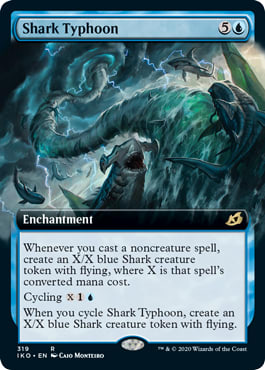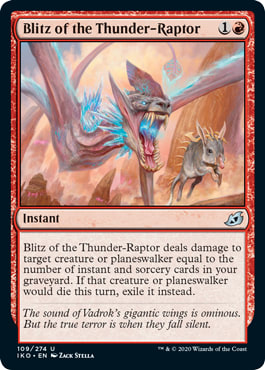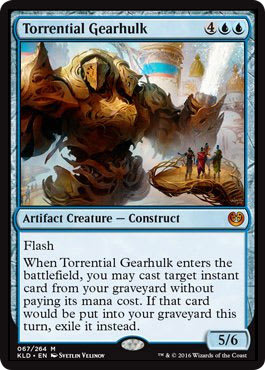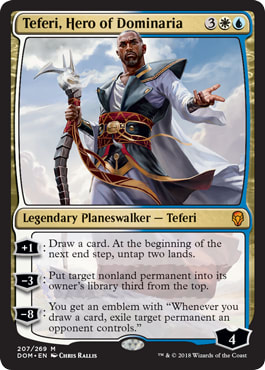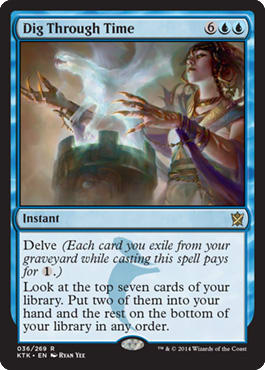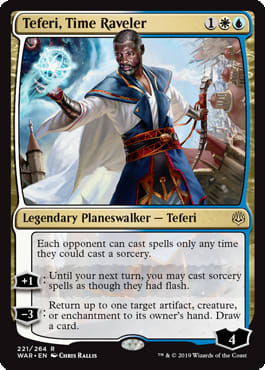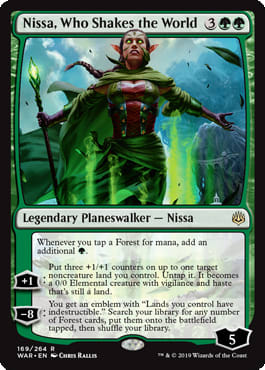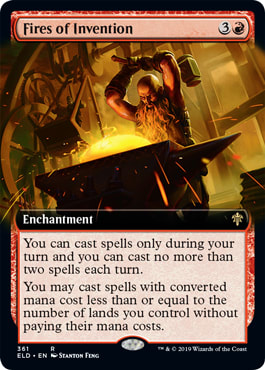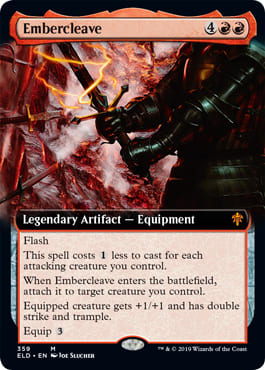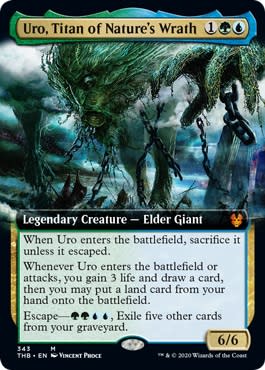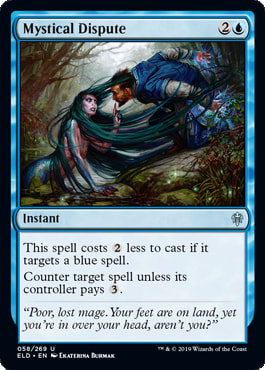Deck-building in new formats is hard.
You have a whole set of new cards and mechanics to evaluate, which becomes even more difficult when you need to properly integrate them with an already dynamic Standard format that has been a moving target for months. You're bringing a new, untuned idea to a table of already established, tried and true ideas and hoping to overcome this experience gap; mistakes are easy to make.
I know this because last weekend during the Lotus Box Standard Open, I made just about every mistake possible one can make it a new format.
A control player a heart, I brewed up what I thought was a good take on draw-go control with an assortment of new cards:
Turtle Control | IKO Standard | Jim Davis
- Creatures (4)
- 4 Yidaro, Wandering Monster
- Instants (28)
- 1 Essence Scatter
- 1 Tale's End
- 1 Thassa's Intervention
- 2 Shock
- 3 Scorching Dragonfire
- 4 Blitz of the Thunder-Raptor
- 4 Chemister's Insight
- 4 Ionize
- 4 Mystical Dispute
- 4 Opt
- Enchantments (3)
- 3 Shark Typhoon
- Lands (25)
- 7 Island
- 8 Mountain
- 2 Castle Vantress
- 4 Steam Vents
- 4 Temple of Epiphany
- Sideboard (15)
- 4 Aether Gust
- 1 Disdainful Stroke
- 3 Flame Sweep
- 1 Scorching Dragonfire
- 1 Spectral Sailor
- 4 Sprite Dragon
- 1 Tale's End
Expecting a ton of Gyruda decks, Flash decks, and Jeskai Fires decks, playing the maximum amount of Mystical Dispute felt great, alongside the usual mix of removal and counterspells. Countering Gyruda, Doom of Depths is one of the only clean ways to interact with it and I expected a ton of Gyruda decks.
Yidaro, Wandering Monster feels tailor made for a draw-go control deck, as it's a win condition you never need to cast or tap out for on your main phase. You can keep cycling it when you can while dealing with your opponent's threats, and eventually you'll have a never ending stream of cantriping uncounterable 8/8s to win the game with. Shark Typhoon is similar, giving you an uncounterable piece of interaction in the midgame and win condition later in the game.
Blitz of the Thunder-Raptor was perhaps the most exciting addition, giving the deck an actual way to kill planeswalkers and larger creatures - something Izzet decks have always struggled with. It even exiles for good measure, making it phenomenal against cards like Uro, Titan of Nature's Wrath. This was the Hero's Downfall effect that made the deck not need to rely on another color.
It all sounds good on paper right?
Well, as they say, you play the games for a reason. I was quickly 0-2 in the Lotus Box Open, losing to a low to the ground Lurrus of the Dream-Den deck and Temur Reclamation. I would battle back for a bit but eventually drop at 4-4, but I was able to recognize my mistakes much earlier than that. But while I suffered, you don't have to!
Today I'm going to go over the major deck-building mistakes I made with Turtle Control, so that you can learn to avoid them in your own deck-building for the new Ikoria Standard format and beyond.
Mistake #1 - Not Having A Powerful Engine
Think about every good deck in Standard.
Jeskai Fires - Fires of Invention
Bant Midrange - Nissa, Who Shakes The World and Hydroid Krasis
Temur Reclamation - Wilderness Reclamation and Expansion // Explosion
Rakdos Sacrifice - Witch's Oven and Cauldron Familiar
Temur Adventures - Lucky Clover and Edgewall Innkeeper
And so on.
Pretty much every successful Standard deck, as well as most successful decks in general, have some sort of engine. For a deck like Jeskai Fires or Temur Reclamation, this engine revolves around the deck's namesake card. Once Fires of Invention or Wilderness Reclamation hit the battlefield, the deck gets to push things into overdrive and really do its thing. Almost every deck has some powerful thing it is building towards, and once it sets that thing up it gets to do things that are more powerful than average. Sometimes it's just a single card that works well with all the other cards, sometimes it's a combination of two cards working well together.
What's the engine in Turtle Control?
...that's it?
Turtle Control is basically relying on a glorified Inspiration to fuel itself into a full control game. The games it doesn't draw Chemister's Insight it can struggle to keep up, drawing either too many lands or too many of the wrong answers at the wrong times. Chemister's Insight isn't a bad Magic card, but it's laughable as an engine when compared to the other powerful things you can be doing in the Standard format.
Now these are powerful engines for a control deck. These cards give a control deck something powerful to work towards, which makes the small-ball one for ones of the early game really pan out. Turtle Control lacks one of these great pieces, and therefore really struggles when its answers don't line up perfectly.
Which leads us to our next issue.
Mistake #2 - Not Playing Any Good Cards
What are the best cards in the format?
While not a complete or entirely scientific list, this is for the most part the most powerful cards in the format.
The only one of those that is in Turtle Control is Mystical Dispute, which is also fantastic against us so it's a bit of a wash. It's also not super effective against a number of decks in the format.
That's a lot of power we are leaving on the table, which means that we're often going to be outgunned in most matchups on power level alone. This isn't a great place to be unless you're exceedingly well positioned, or you are using your underpowered cards to form a powerful engine that is more than the sum of its parts (which we've already established that we aren't). We won't always have the one for one answers for things, and when something does slip through our counterspells and removal it's likely to be more powerful than what we are doing.
But even if we are able to successfully one for one our opponent like planned, it gets even worse.
Mistake #3 - Trying To One for One Against Companion Decks
Imagine building your deck and taking it into a tournament with the intention of playing a one for one control game, where we want to trade resources in the early and mid game and eventually pull ahead and out draw our opponent, but your opponent gets to start with an extra card in their hand every game.
That's basically the equivalent of signing up for a tournament and agreeing to mulligan to six every game. I played against a companion almost every round of the Lotus Box Open, which will likely be the new normal going forward.
Companions have, for better or worse, completely changed the rules of engagement for a game of Magic. Deck-building constraints aside, a player playing a companion starts the game with one more piece of cardboard than a player without. I've already given my full thoughts on the mechanic on my YouTube channel, but there's no denying the resource advantage that the companion player gets.
This is not an insurmountable advantage. Companion decks will naturally have a somewhat lower power level than non-companion decks, and if you're playing a deck that is somewhat proactive in nature or is able to generate a large amount of cards in a reasonable timeframe you may not even notice. It doesn't always matter how many cards your opponent has in hand if you're attacking for lethal with three free copies of Cavalier of Flame or drawing a fistful of cards with a Nissa-fueled Hydroid Krasis, but if you're trying to play a one for one resource game it matters a lot.
As I have said before, the issue with companion is that it is presented as an opportunity cost: "Can I afford to warp my deck-building to play this card?" But the real opportunity cost ends up being: "Can I afford to build a deck that doesn't start with an 8th card in hand?
You need to have a very good reason to put yourself down a card and not play a companion in Standard at present, which brings us to our final mistake.
Mistake #4 - Not Playing My Own Companion
What the hell was I thinking?
I could have played a Zirda, the Dawnwalker as my companion for the low low cost of a single sideboard slot. My maindeck already met the requirement, and while I would not be able to use the companion when I boarded in Sprite Dragon, the random body wouldn't have been super relevant in those matchups anyway.
This was a monumental blunder.
There's a lot of pressure to build your deck in a manner that can use a companion in Standard because having an 8th card in your opening hand is so good, even if it's just a marginal creature and I didn't even have to change a thing! How many games would have that extra 3/3 attacker or blocker swung? It's hard to say exactly, but for a deck looking to one for one not playing a free extra card is a huge error.
In Standard right now you should either be playing a companion, or be playing a deck that is doing something powerful enough to not care about playing a companion. I did neither.
Magic Is Hard
There's a reason that Magic is the best game in the world - it's so difficult to solve!
As we learn how to parse and understand an entire set's worth of new cards and mechanics we're going to make lots of mistakes. Optimal versions of the current "best" decks two months from now are going to make the versions now look silly, and it's astounding how much card evaluations changes in the first week of a set's release. Just look at how often the best players in the world are wrong during preview season. The most important things about mistakes however is to make sure you learn from them.
As Master Splinter said: "Wisdom comes from experience, and experience comes from making mistakes."















